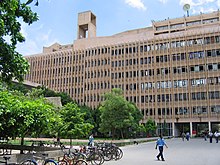Schools and higher educational institutions in Delhi are administered either by the Directorate of Education, the NCT government, or private organizations. In 2004–05, there were 2,515 primary, 635 middle, 504 secondary and 1,208 senior secondary schools in Delhi. That year, the higher education institutions in the city included 165 colleges, among them five medical colleges and eight engineering colleges, seven major universities (Delhi University, Jawaharlal Nehru University, Jamia Millia Islamia, Guru Gobind Singh Indraprastha University (GGSIPU), National Law University, Indira Gandhi National Open University (IGNOU) and Jamia Hamdard), and nine deemed universities. Guru Gobind Singh Indraprastha University and National Law University are the only state universities; IGNOU is for open/distance learning; the rest are all central universities. Delhi boasts of being home to 3 of top 10 engineering colleges in India – IIT Delhi, NSIT (Formerly DIT) and DTU (Formerly DCE).
Private schools in Delhi—which employ either English or Hindi as the language of instruction—are affiliated to one of two administering bodies: the Council for the Indian School Certificate Examinations (CISCE), the Central Board for Secondary Education (CBSE) and the National Institute of Open Schooling (NIOS). In 2004–05, approximately 15.29 lakh (1.529 million) students were enrolled in primary schools, 8.22 lakh (0.822 million) in middle schools and 6.69 lakh (0.669 million) in secondary schools across Delhi. Female students represented 49% of the total enrollment. The same year, the Delhi government spent between 1.58% and 1.95% of its gross state domestic product on education.
After completing the ten-year secondary phase of their education under the 10+2+3/4 plan, students typically spend the next two years either in junior colleges or in schools with senior secondary facilities, during which their studies become more focused. They select a stream of study—liberal arts, commerce, science, or, less commonly, vocational. Upon completion, those who choose to continue, either study for a three-year undergraduate degree at a college, or a professional degree in law, engineering, or medicine. Notable higher education or research institutes in Delhi include All India Institute of Medical Sciences, Dr.Ram Manohar Lohia Hospital & PGIMER, Maulana Azad Medical College,Jawaharlal Nehru University, Indian Statistical Institute, Indian Institute of Technology Delhi, Indian Institute of Foreign Trade, Delhi Technological University, National Law University, Delhi, Netaji Subhas Institute of Technology, Indian Law Institute, Delhi School of Economics, Jamia Millia Islamia. As of 2008, about 16% of all Delhi residents possessed at least a college graduate degree.


No comments:
Post a Comment